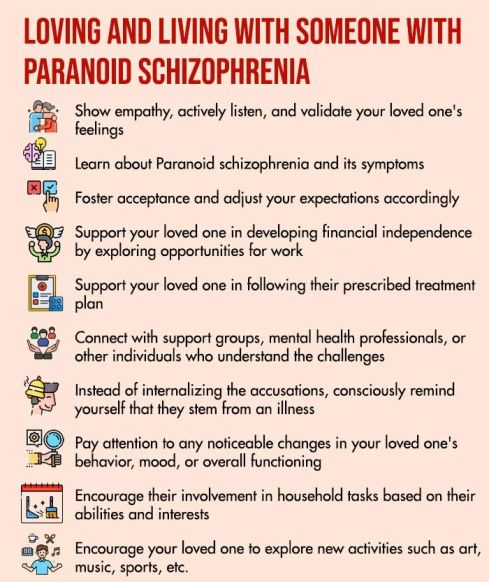Helping someone with paranoid schizophrenia requires providing unwavering emotional support, actively promoting adherence to their prescribed treatment, and guiding them through the various challenges and triggers they may encounter. It is important to recognize that these challenges can impact the well-being of caregivers and strain their relationships with their loved ones.
How to Help Someone with Paranoid Schizophrenia
Living with someone with paranoid schizophrenia can be challenging 1 Scherzer, P., Achim, A., Léveillé, E., Boisseau, E., & Stip, E. (2015). Evidence from paranoid schizophrenia for more than one component of theory of mind. Frontiers in psychology, 6, 1643. https://doi.org/10.3389/fpsyg.2015.01643 due to its chronic and disabling nature. The condition can have a severe impact on individuals, leaving caregivers uncertain about how best to assist their loved ones.
Support from family and friends plays a vital role in the treatment of paranoid schizophrenia, yet aiding and supporting someone with this condition can be emotionally draining and stressful, particularly when the individual fails to recognize their mental health struggles.
It is crucial to prioritize encouraging the family member with paranoid schizophrenia to seek medical care as it plays a vital role 2 Krzystanek, M., Krysta, K., & Skałacka, K. (2017). Treatment Compliance in the Long-Term Paranoid Schizophrenia Telemedicine Study. Journal of technology in behavioral science, 2(2), 84–87. https://doi.org/10.1007/s41347-017-0016-4 in providing effective support.
Equally important for caregivers is the establishment of healthy boundaries and the prioritization of their own well-being. Therefore, seeking counseling or participating in support groups both are necessary to cope with the condition.
Read More About Paranoid Schizophrenia Here
Ways to Support a Loved One with Paranoid Schizophrenia
Supporting a loved one with paranoid schizophrenia involves a multifaceted approach 3 Pinkham, A. E., Harvey, P. D., & Penn, D. L. (2016). PARANOID INDIVIDUALS WITH SCHIZOPHRENIA SHOW GREATER SOCIAL COGNITIVE BIAS AND WORSE SOCIAL FUNCTIONING THAN NON-PARANOID INDIVIDUALS WITH SCHIZOPHRENIA. Schizophrenia research. Cognition, 3, 33–38. https://doi.org/10.1016/j.scog.2015.11.002 that combines empathy, education, and practical assistance. Here are some ways to provide support:
1. Educate Yourself
Learn about this specific disorder to better understand the condition and its impact. This can help you feel more empowered and equipped with ways to support a loved one with paranoid schizophrenia.
2. Show Empathy and Active Listening
Be understanding and compassionate towards their experiences and emotions. Practice active listening by attentively hearing their concerns without judgment or interruption.
3. Encourage Treatment Adherence
Support their compliance with prescribed medications, therapy sessions, and other treatment recommendations. Remind them of the importance of consistency and provide gentle reminders when necessary.
4. Establish a Safe Environment
Create a safe and calm space where they feel secure and understood. Minimize stressors and triggers, and be mindful of their boundaries and sensitivities.
5. Offer Practical Assistance
Help with daily tasks, such as managing appointments, organizing medication, or accompanying them to therapy sessions. Assist in building a routine and structure that supports their well-being.
6. Foster Social Connections
Encourage social engagement and support networks. Participating in support groups or connecting with individuals who have similar experiences can provide a sense of community and understanding.
7. Practice Effective Communication
Use clear and straightforward language, avoiding ambiguous or confusing statements. Be patient and give them time to express themselves. Validate their feelings and experiences.
8. Prioritize Self-care
Supporting someone with paranoid schizophrenia can be challenging, so make sure to take care of your own physical and mental well-being.
Read More About Self Care And Wellness Here
How to Deal with Caregiver’s Stress in Paranoid Schizophrenia
Here are some strategies 4 Rahmani, F., Ranjbar, F., Hosseinzadeh, M., Razavi, S. S., Dickens, G. L., & Vahidi, M. (2019). Coping strategies of family caregivers of patients with schizophrenia in Iran: A cross-sectional survey. International journal of nursing sciences, 6(2), 148–153. https://doi.org/10.1016/j.ijnss.2019.03.006 to help cope with caregiver stress and lighten the burden:
- Reach out to friends, family members, or trusted individuals who can provide emotional support, or with whom you can share responsibilities.
- Make sure to prioritize your physical well-being by maintaining a healthy lifestyle, such as eating nutritious meals and engaging in regular exercise.
- Engage in stress-relieving activities such as meditation, deep breathing exercises, and yoga, or mindfulness.
- Balance your expectations and focus on small victories and progress. Celebrate and appreciate even the smallest positive moments.
- Evaluate the impact of your stress levels on daily life by identifying the triggering signs.
- Be mindful of your emotions, thoughts, and overall well-being, giving yourself a free space to vent out your feelings.
- If caregiver stress becomes overwhelming or keeps affecting your daily well-being, seek support from mental health professionals.

Takeaway
Providing help to a family member with paranoid schizophrenia involves offering empathy, encouraging treatment adherence, and seeking professional assistance when needed. It is essential to prioritize self-care and maintain open communication to foster a safe and understanding environment for their well-being and recovery.
At A Glance
- Living with someone with paranoid schizophrenia can be challenging due to its chronic and disabling nature.
- It is important to recognize that these challenges can impact the well-being of caregivers and strain their relationships with their loved ones.
- Participating in support groups or connecting with individuals who have similar experiences can provide a sense of community and understanding.
- Supporting a loved one with paranoid schizophrenia involves a multifaceted approach that combines empathy, education, and practical assistance.
- Reaching out to friends, and family members, prioritizing physical well-being, and stress-relieving activities can help cope with caregiver stress.
Frequently Asked Questions (FAQs)
1. Is it safe to live with someone who has schizophrenia?
Living with someone who has schizophrenia can be safe under certain conditions. With proper treatment, support, and a well-managed environment, individuals with schizophrenia can live fulfilling and stable lives.
2. What not to say to someone with paranoid schizophrenia?
Avoid using stigmatizing language or making derogatory remarks about their condition, such as referring to them as “crazy,” “insane,” or “mentally unstable.”
3. How to help someone with paranoid schizophrenia who refuses treatment?
Demonstrate active and empathetic listening to their concerns, providing a supportive and open-minded environment. Engage in a conversation about the benefits of treatment, emphasizing that their condition is an illness that can be effectively managed and treated.















